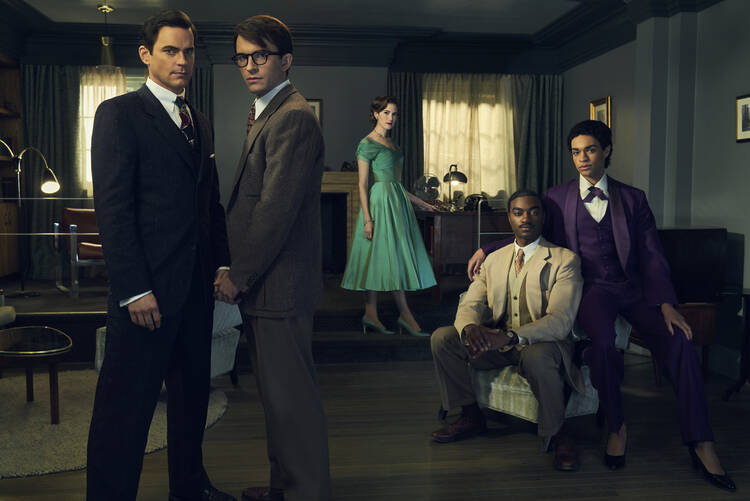In 1954, the Illinois-born Senator Lester C. Hunt—a former baseball player and war veteran who moved to Wyoming and then represented its people in Washington—felt he had run out of options when he entered his Senate office and shot a bullet through his brain. Physical health concerns, The New York Times reported, had driven the 61-year-old Democrat to his tragic end, but the newspaper columnist Drew Pearson had another explanation.
A year earlier, Lester Hunt Jr., a 20-something theology student known as “Buddy,” was arrested in our nation’s capital for soliciting gay sex from a plainclothes police officer. The charges were later dismissed, but the story hung around Washington like a dense fog, emboldening Senator Hunt’s political adversaries and slowly suffocating the embarrassed politician.
‘Fellow Travelers’ is a broad and intimate depiction of late 20th century gay life and the events that shaped it.
The senator had made powerful enemies by publicly opposing Senator Joseph McCarthy and his anti-communist “witch hunts,” a yearslong crusade that saw suspected radicals and gay people, termed “moral weaklings,” driven out of the federal government and blacklisted by American society. Hunt labeled McCarthy an “opportunist” and a “drunk,” and after the ignominious arrest of the senator’s son, McCarthy went on the attack.
In his popular column on the “Washington Merry-Go-Round,” Pearson reported that Senator Herman Welker, a Republican of Idaho and apostle of McCarthyism, pressured Hunt to not seek re-election in exchange for the charges against his son being dropped. A simple proposition: Leave your job and we won’t send your gay son to jail. Just another day on the Hill.
“The incident was one of the lowest types of political pressure this writer has seen in many years,” wrote Pearson, “and illustrates the lengths to which certain Republicans will go to capture one seat in the narrowly balanced Senate.”
It is this environment of homophobia, prejudice and naked political gamesmanship that threatens the fictional gay characters at the center of “Fellow Travelers,” an eight-part miniseries following the tumultuous love affair—from the Red Scare to the AIDS crisis—between Hawkins “Hawk” Fuller and Tim “Skippy” Laughlin.
At its core, ‘Fellow Travelers’ is a love story, marked by the same passion, betrayal, heartache and ecstasy as all the rest.
Based on the 2007 book by Thomas Mallon and created by Ron Nyswaner (who won an Oscar in 1994 for writing the gay-themed legal drama “Philadelphia”), Showtime’s “Fellow Travelers” is a breathtaking achievement in storytelling, tackling complex historical events over three decades and investigating the intersections between Catholicism, homosexuality, racism and what it means to love someone. Akin to Tony Kushner’s “Angels in America,” the Pulitzer Prize-winning play set during the AIDS crisis (and also including some McCarthy-era figures), “Fellow Travelers” is a broad and intimate depiction of late 20th century gay life and the events that shaped it.
Hawk Fuller (Matt Bomer)—a suave, urbane State Department bureaucrat educated by the Jesuits, ambivalent about God and enamored by Senator McCarthy—meets Tim Laughlin (Jonathan Bailey) at an election night party for President Dwight Eisenhower in 1952. Tim, who worked on Eisenhower’s campaign in New York, is sitting at a bar drinking milk. (Yes, milk.) In many ways, Tim, whom Hawk nicknames “Skippy,” is a precocious child: bookish, naive, hyperintellectual, a “good Catholic boy” from Fordham. And despite McCarthy’s quest to root out Communists and homosexuals, “subversives and deviants,” from American life, Skippy still supports him.
The two men are deeply closeted; Tim is wracked with Catholic guilt over his attraction to men, while Hawk engages in clandestine sexual encounters in public restrooms. The streetwise Hawk is an accomplished liar. He has made an art out of concealing his sexuality and staying close to the Republicans in power. One senator mentions to Hawk the rumors that Roy Cohn, an amoral lawyer and McCarthy’s right-hand man, is gay. “Look at Cohn, fussin’ over that boy like a newlywed. Turns your stomach,” says the senator to Hawk. “It certainly does,” he replies.
Tim and Hawk begin a sexual relationship, despite the fact Hawk is set to marry a prominent senator’s daughter. But when Hawk tells Tim he sees their relationship as not much more than a fling, Tim angrily confronts him. “I committed mortal sins for you. I could go to hell,” says Tim. “Hell’s a fantasy, Skippy,” retorts Hawk. “The Trinity, democracy and the holy war against Communism: Grand ideas that just get people killed.”
Tim’s Catholic faith plays a central role in the series, acting as both antagonist and comforter, torturer and savior.
Tim’s Catholic faith plays a central role in the series, acting as both antagonist and comforter, torturer and savior. He eventually renounces his faith and “stops worshiping false idols,” including Senator McCarthy, but continues to speak about God. Decades later, he keeps a copy of Thomas Merton’s The Seven Storey Mountain beside his deathbed. “I spent most of my life waiting for God to love me. And then I realized the only thing that matters is that I love God. It’s the same with you,” Tim tells Hawk shortly before the former’s death.
Amid the Lavender Scare, a government-wide crackdown on homosexuality that saw gay Americans fired from their jobs, jailed for their relationships and brutalized in the streets by law enforcement, Tim quits his job, Hawk marries a woman as a beard, and the two men don’t see each other for 11 years. When they reconnect, things have fallen apart for Hawk. Tim, a former anti-war activist who found work as a social worker in San Francisco’s Castro District, finds Hawk poorly managing alcohol-induced gastritis, snorting cocaine, and living in a beach house on Fire Island after abandoning his family. His son is dead from a heroin overdose and he refuses to speak about it. How did we get here?
The miniseries moves freely between the McCarthy era and the AIDS crisis, where moments of historical turmoil reveal deeper insights about the ironclad bond between Hawk and Tim. Crises in these men’s lives parallel the Sturm und Drang of the late 20th century, but the periods of chaos and confusion lay bare the true, selfless love between Hawk and Tim. By 1986, when Tim is hospitalized with Kaposi’s sarcoma, a cancer common among H.I.V. patients, Hawk spends much of his days beside Tim’s bed—in good times and bad, in sickness and in health.
“Fellow Travelers”—its title a double entendre referencing Communist sympathizers and gay men—is not myopic in its focus on Hawk and Tim. The miniseries also chronicles the relationship between Marcus Gaines, a gay Black man who battles the racist attitudes of 1950s Washington and later conceals his sexuality when he becomes a high school teacher in San Francisco, and Frankie Hines, a Black drag queen and gay rights activist open and unapologetic about his identity. They face the combined racial and sexual intolerance of their era—navigating prejudices that continue to this day.
While “Fellow Travelers” is set in the decades before many younger viewers may have been alive, it remains accessible across generations. At its core, it is a love story, marked by the same passion, betrayal, heartache and ecstasy as all the rest. As Tim tells Hawk during the McCarthy years, they aren’t concealing who they sleep with, but who they love.








